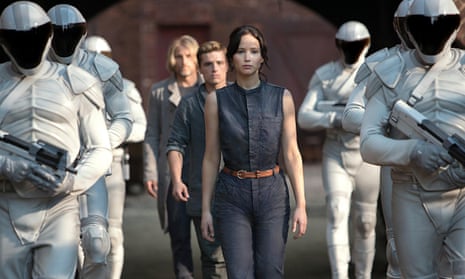It’s an easy win for a book critic. Harry Potter, then Hunger Games, and now Divergent have dominated not just book publishing but popular culture for more than two decades. So after telling adult readers they should be ashamed to read children’s books, all Ruth Graham had to do was sit back and watch the outrage unfold. The Times film critic, AO Scott, took the same argument a step further this week by proclaiming the death of adulthood itself, with young adult fiction the leading symptom of a culture collapsing into permanent adolescence.
But is the failure of “serious” literature for adults really the fault of an immature readership? And make no mistake, it is a failure. A glance at any fiction bestseller list of recent years shows publishing dominated by escapist fantasies, violent crime thrillers, various shades of erotica and, of course, young adult. In 2013, among the only works of adult fiction to reach widespread public awareness was Donna Tartt’s The Goldfinch, a coming-of-age story that follows its protagonist through, yes, his young adulthood. Isn’t it more credible that the sub-culture of serious literature is at fault, rather than every single person who enjoys reading the Hunger Games?
What do these critics and academics even mean when they call adult literature serious? This descriptor gets thrown around but never defined. Were I to make the same reductive assessment of all adult literature that the genre’s critics make of YA fiction, then the serious novel would be about a middle-aged person struggling with career collapse and sexual frustration. I don’t want to belittle these topics, but they’re only serious to sexually frustrated middle-aged people, coincidentally being the same narrow demographic that adult literature seems to serve. And they clearly don’t read as many books as their kids.
In every way that matters, young adult fiction is the most serious literature in contemporary culture. But its serious intent manifests in ways that many critics struggle to comprehend. The success of young adult fiction has been matched by the rise of sci-fi and fantasy in popular culture, and both employ the same tools of allegory and metaphor. The Maze Runner hits cinemas soon, the latest in a long line of young adult stories born in books to bring a fantasy allegory to a mass audience. But it’s the meaning of these allegorical tales that really underlies the success of young adult literature today.
Young adult novels externalise evil as an enemy that can be seen and understood. They give teenagers a Lord Voldemort, a monster that can be defeated, an evil that can be vanquished. But increasingly the evil in young adult fiction is the adult world itself. In the Hunger Games it’s an adult world of political and economic repression. In Divergent it’s an adult world that demands conformity, at the expense of the individual. In The Maze Runner it’s an adult world that has escalated to such technological complexity that we are all lost within it. And increasingly, it’s not just teenagers that need allegorical warnings against adult reality, but adults themselves.
Is it possible that young adult novels are supremely popular not because we are a culture of infantilised idiots, but because they are the best guide we have to the dysfunctional reality of adult life? The criticisms of Ruth Graham and AO Scott rely on the tacit assumption that retreating from adult reality is both weak and wrong. Well. If adult reality is a vast burden of debt, a crushing, meaningless job in a corporate bureaucracy, and 24/7 status alerts from your boss direct to your Google glasses, then I’d like to be among the adults sounding the retreat to the generation of kids coming up behind us: run for your lives, kids! And don’t let the adults caught in the maze keep you trapped there with them.

Comments (…)
Sign in or create your Guardian account to join the discussion